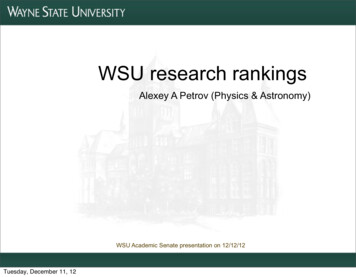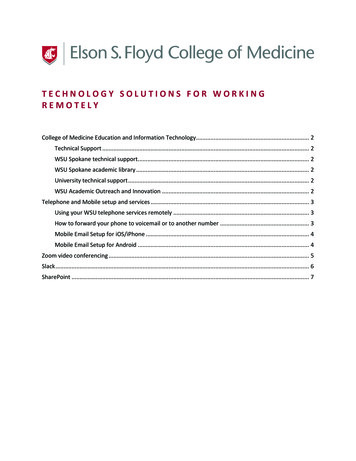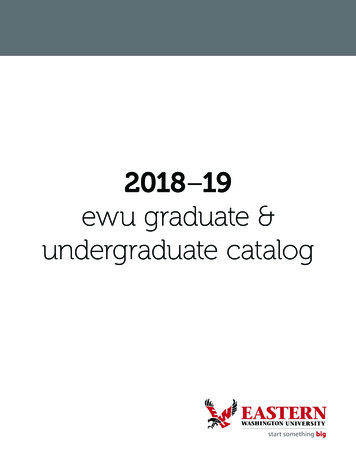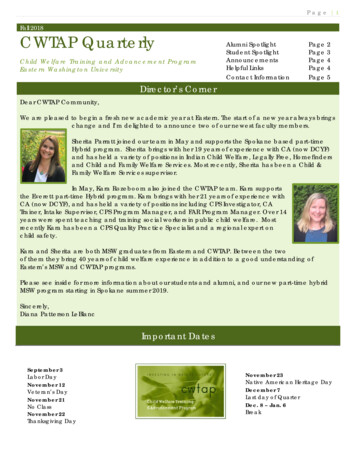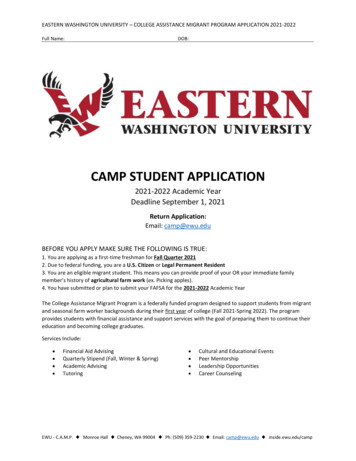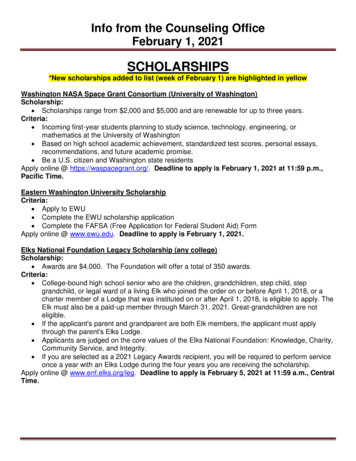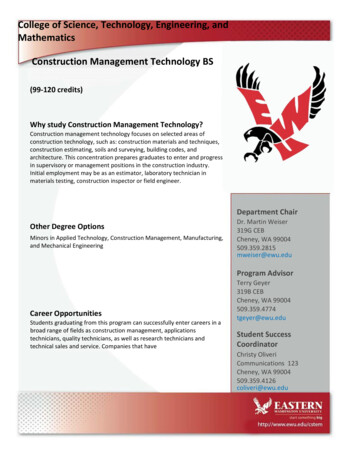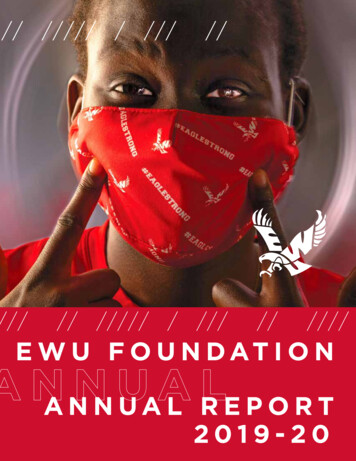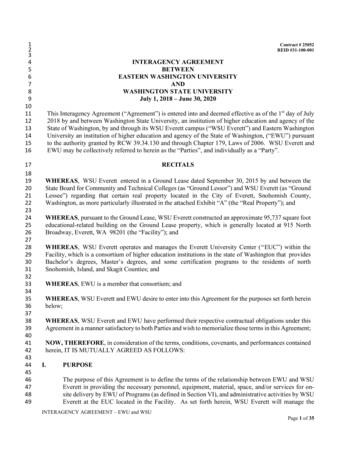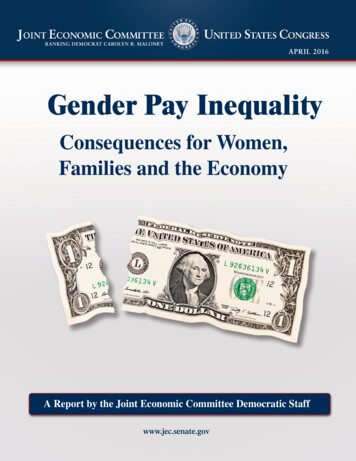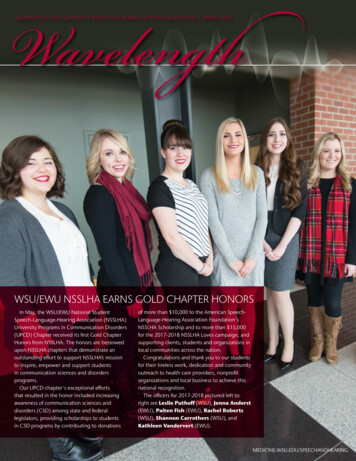
Transcription
WASHINGTON STATE UNIVERSITY SPEECH AND HEARING SCIENCES NEWSLETTER SPRING 2018WSU/EWU NSSLHA EARNS GOLD CHAPTER HONORSIn May, the WSU/EWU National StudentSpeech-Language-Hearing Association (NSSLHA)University Programs in Communication Disorders(UPCD) Chapter received its first Gold ChapterHonors from NSSLHA. The honors are bestowedupon NSSLHA chapters that demonstrate anoutstanding effort to support NSSLHA’s missionto inspire, empower and support studentsin communication sciences and disordersprograms.Our UPCD chapter's exceptional effortsthat resulted in the honor included increasingawareness of communication sciences anddisorders (CSD) among state and federallegislators, providing scholarships to studentsin CSD programs by contributing to donationsof more than 10,000 to the American SpeechLanguage-Hearing Association Foundation'sNSSLHA Scholarship and to more than 15,000for the 2017-2018 NSSLHA Loves campaign, andsupporting clients, students and organizations inlocal communities across the nation.Congratulations and thank you to our studentsfor their tireless work, dedication and communityoutreach to health care providers, nonprofitorganizations and local business to achieve thisnational recognition.The officers for 2017-2018 pictured left toright are Leslie Puthoff (WSU), Jenna Anderst(EWU), Paiten Fish (EWU), Rachel Roberts(WSU), Shannon Carrothers (WSU), andKathleen Vandervert (EWU).MEDICINE.WSU.EDU/SPEECHANDHEARING
FOCUS ON ALUMNIAnna C. Diedesch,Au.D., Ph.D.B.A. ’04As I walked across the stage at BeasleyColiseum in Pullman to receive my B.A.in Speech and Hearing Sciences (May’04), I honestly could not have predictedthe journey I was about to begin towardbecoming a clinical researcher andeducator in audiology. It has been a longadventure since I left WSU to pursue myclinical doctorate in audiology (Au.D.),culminating last year when I accepteda position as an assistant professor forWestern Washington University’s newAu.D. program. Ironically, during myfreshman year at WSU, I switched majorsto speech and hearing sciences becauseI was told that to become a high schoolmath teacher, my dream job at the time,I needed to major in both mathematicsand education. At the time, I thought thatwas way too much schooling to becomean educator. I would later complete afour-year Au.D. program, fall in love withresearch and continue my education,obtaining my Ph.D. in audiology priorto taking a position in academia.While I have traveled a bit for myeducation and training, I have alwaysbeen a Coug at heart. I take pride inbeing a third-generation WSU alumnusand the first of five siblings to receivedegrees from WSU. In fact, the Diedeschsiblings’ occupation of Pullman lasted16 consecutive years (2000-2016).When I was accepted to the University ofWashington to pursue my Ph.D. in 2011,my dad joked that I was “out of the will.”He later retracted his statement whenmy mentor, G. Christopher Stecker,took a position in Nashville, Tenn., andasked me to join his lab at Vanderbilt. This2meant, to my father’s satisfaction, that mydiploma would not have a purple W on itafter all. I carried my WSU pride into thelab, being known to dress the acousticmanikin (KEMAR) on which I collectedhearing aid data for my research, in myold WSU intramural championship t-shirt.Dr. Stecker was less than thrilled that Iprominently displayed my WSU swag inboth his labs in Seattle and Nashville.All joking and school rivalries aside, Ihave enjoyed spending time reflecting onthe goals I set for myself at the start of mycareer preparation at WSU. In my senioryear, I had to make a challenging careerdecision. I was the last undergraduate classto have a choice to pursue either a master’sin audiology or the new Au.D. degree.I spent endless hours researching Au.D.programs, trying to decide if I wanted topursue a master’s degree at WSU Spokaneor attend a three-year or four-year Au.D.program, which would require me toleave the Northwest. I ended up choosingWichita State University, a four-yearAu.D. program. However, I returned tothe Northwest for my rotations at theNational Center for Rehabilitative AuditoryResearch (NCRAR) at the Portland VAMedical Center in Portland, Ore. Mymentors, Drs. Marjorie Leek andFrederick J. Gallun, encouraged me tocontinue working at NCRAR as a researchaudiologist after I earned my Au.D. andinstilled in me the courage to apply to aPh.D. program in 2011. I earned my Ph.D.from Vanderbilt University in summer 2016after completing my dissertation on howhearing aid venting and reverberationalter sound localization cues. Followingconferral of my degree, I accepted apostdoctoral research position at theOregon Health and Science Universityand NCRAR, funded by the Frederick V.Hunt Postdoctoral Research FellowshipWSU ELSON S. FLOYD COLLEGE OF MEDICINE SPEECH AND HEARING SCIENCESfrom the Acoustical Society of America.During my Au.D. program, I becameincreasingly concerned that the transitionfrom the master’s degree to the Au.D. asthe entry-level professional degree wouldproduce fewer clinical researchers in ourfield due to the amount of time, educationand resources needed to attain both Au.D.and Ph.D. degrees. Over the years, severalprograms have established an acceleratedjoint Au.D./Ph.D. program. Nonetheless,the time commitment and cost of suchprograms deter some from pursuing thispath. I now join others who have obtainedboth the clinical and the research degreesand have entered higher education withthe goal of contributing to the researchbase of the field while educating thenext generation of audiologists.I am thrilled to have begun my careerin my home state of Washington. In theend, I may not be a high school mathteacher, but I have my dream job andmore. I teach several topics that build onmathematical concepts, and I also havethe pleasure of supervising students inthe clinic, working with hard-of-hearingpatients, and continuing my hearing aidresearch. I am thankful for all the supportof my mentors, peers and family. Myjourney has been unpredictable, extensiveand rewarding since it began at WSU in2000. I look forward to an equally variedand rewarding career in academia.
MESSAGE FROM THE CHAIRThe 2017-2018academic year hasbeen a banner yearby many measures,all aligned with ourmission to preparefuture generationsof speech-languagepathologists to deliver compassionate,personalized care to individuals over thelife span, across diverse communities.With the inaugural class of medicalstudents joining us on the WSU HealthSciences Spokane campus this past fall,the potential synergies of interprofessionalcollaborations continue to grow. Thesecollaborations enhance our students’academic experience, ensure innovativeclinical opportunities and broadenthe impact of our faculty’s research.We are proud of our WSU/EWUNational Student Speech-LanguageHearing Association (NSSLHA) team thatearned 2nd place at the National NSSLHAKnowledge Bowl held in conjunctionwith the 2017 annual convention of theAmerican Speech-Language-HearingAssociation in Los Angeles. Our teamscored just a few fractions of a pointbehind the 1st place winner. Kudos to ourwinning graduate student team composedof Tiana Bennett (WSU), Lacy Hefley(EWU), Jennifer Owens (EWU), SaritaThotakat (WSU), and Rachel Verdun(EWU). Also eliciting great pride are theimpressive educational, fundraising andcommunity outreach activities of our localNSSLHA chapter and our MulticulturalClub. Their activities are summarized inNSSLHA Notes and Multicultural ClubIn Action in this issue of Wavelength.Also in this issue, you can read aboutthe many accomplishments of ourfaculty, students and alumni duringthe past academic year. Once again,a number of our undergraduate andgraduate students were recognized fortheir academic and clinical excellence,as well as for their involvement in thecommunity. Our faculty continued toearn recognition for their exceptionalcontributions to our professions,clinical practice, research and theirdedication to our students, deliveringthe best educational preparation to ouracademically-talented, highly-engaged,future speech-language pathologists(and audiologists). In particular, wecongratulate Dr. Mark VanDam whoreceived a 2018 Chancellor’s Awardfor Leadership and Engagement inrecognition of his exceptional service tothe university and the community, and formentoring his students in the classroomand in his lab. I know you will find thepersonal and professional journeys oftwo alumni showcased in this issueinspiring, and not necessarily alignedwith the expected linear trajectory.Of course, we do not succeed in oureducational or patient care missions alone.In close cooperation with our dedicatedoff-site practicum and internshipsupervisors, we prepare our studentsto assume their future responsibilitiesto provide the best possible healthcare in the many different settings andcommunities in which they will serve.Regardless of the metric—awards,honors, scholarships, grants, publications,presentations, consultations or outreach—our faculty, students and alumnicontinue to excel. The highlights inthis issue of Wavelength are just a fewof the numerous accomplishments inundergraduate and graduate education,research, interprofessional collaborationand community engagement thatcontinue to propel the departmentin shaping the speech-languagepathology workforce and the future ofthe profession. We invite you to browsethrough our website at medicine.wsu.eduto learn more about our ongoing work.I extend my heartfelt appreciation toour donors who have given so generouslyto the department during the 2018 fiscalyear. Your support has a profound impacton our students, bringing them closer toachieving their goals and empoweringthem to contribute to their communities.Your names will be prominently displayedin the 2017-2018 WSU Foundation AnnualReport, which will be published in fall2018. Rest assured, your commitmentand gifts will continue to enhanceour students’ learning experienceand preparation for careers in speechlanguage pathology, audiology and manyother fields for generations to come. Ifyou would like to help us continue ourforward motion, you can make a gifttoday on our website or by contacting ourdirector of development at nancy.fike@wsu.edu. We so enjoy hearing from ouralumni and friends—let us know aboutyour life after WSU. With your permission,we will include news of your professionaland personal journeys in our next issue.Please e-mail me at chermak@wsu.edu.I hope this issue of Wavelength providesa glimpse into our values, as well as ouraccomplishments and the important workwe do to prepare students for their careersand their lives as engaged leaders. As Ilook ahead to the future of our programsand our professions, I am filled withoptimism for what we can accomplish. Aswe close another academic year, I lookahead to the continued evolution of ourdepartment in a college and on a campusthat seem to know no boundaries to thecontributions we can make to humanhealth and the economic prosperityof Spokane and beyond. I wish you anenjoyable summer season with family andfriends. Thank you for your commitmentand confidence in us! Our alumni anddonors remain our best friends, strongestadvocates and our ultimate legacy.All the very best —Gail D. Chermak, Ph.D.Professor and Chair,Speech and Hearing SciencesWAVELENGTH SPRING 20173
DOCTOR’S CORNERHow Speech-LanguagePathologists Can Aid inEarly Identification ofAutism Spectrum DisorderEarly identificationof autism spectrumdisorder (ASD)remains a critical areaof research as timelyaccess to appropriate,ASD-specific earlyintervention can leadto significant gains across developmentaldomains. The first step in accurate earlyidentification of ASD involves routinedevelopmental surveillance or universalscreening of all children to identify thoseat risk for atypical development, followedby autism-specific screening. Currently,most research related to universaland ASD-specific screening involvespediatricians as first-line screeners, perthe formal recommendation for universalscreening for ASD provided by theAmerican Academy of Pediatrics (AAP)in 2006. Despite the AAP guidelinesfor surveillance and screening for ASD,a minority of pediatricians performroutine developmental and ASD-specificscreenings, with approximately 18 percentfollowing the specific AAP guidelines.This low rate of universal screening forASD at well-check visits suggests thatother health care professionals, includingspeech-language pathologists (SLPs)working with young children with ASD,should not assume universal screenings forASD are being conducted by pediatriciansand should therefore take more of anactive role in screening for ASD.According to the American SpeechLanguage-Hearing Association (ASHA),SLPs play an important role in allaspects of assessment and treatmentfor ASD including screening rid 8589935303§ion Roles and Responsibilities). For example,SLPs working with families of youngchildren can educate and advocate forbroadband and ASD-specific screenings tobe conducted by their local pediatriciansat well-child visits. SLPs can also directlyconduct developmental and ASD-specificscreenings using valid tools with strongpsychometrics (see Zwaigenbaum etal., 2015 for review of screening tools).One of the most widely used tools is theModified Checklist for Autism in ToddlersRevised with Follow-Up (M-CHAT-R/F).The M-CHAT-R/F is appropriate forchildren 16-30 months of age, has 20yes/no questions for parents to answer,requires minimal training, and takesapproximately five minutes to complete.The scoring algorithm yields three riskranges (low-, medium-, and high-risk). Itis recommended that children with scoresin the medium-risk range receive thefollow-up interview, which typically takesless than 10 minutes to complete, andchildren with scores in the high-risk rangebe directly referred for developmentalassessment. The M-CHAT-R/F is availablefor free download https://www.m-chat.org/ references/mchatdotorg.pdf.As noted by the authors of theM-CHAT-R/F, the tool was designed todetect as many cases of ASD as possibleto maximize sensitivity. Therefore, it canyield a high false positive rate. While theuse of the follow-up interview decreasesthe rate of false positives, it does noteliminate them. In general, false positiveson a screener may lead to unnecessarywork for clinicians and practitionersconducting follow-up assessments and/or possible upset and anxiety for theparents. However, many of the childrenwho screen at risk on the M-CHAT-R/Fand are not diagnosed with ASD areat high risk for other developmentaldisorders or delays suggesting thatfurther evaluation is warranted.WSU ELSON S. FLOYD COLLEGE OF MEDICINE SPEECH AND HEARING SCIENCESIn contrast, recent studies havesuggested that the use of the M-CHAT-R/Fcan also yield a high rate of falsenegatives. For example, a large systematicfollow-up of children who were notidentified as at-risk on the M-CHAT-R/F(mean age 20.16 months, range 16-30months) in primary care and specialty caresites found a high rate of false negatives.Specifically, only 40 percent of childrenwho received a diagnosis of ASD wereidentified at-risk on the M-CHAT-R/F,suggesting that a large proportion ofchildren were missed by the screener.Taken together, the rate of false positiveand false negative cases reported acrossstudies suggest that clinicians shouldnot use a screener alone to confirm orrule out risk or concern for ASD in youngchildren. SLPs should interpret the resultsof the screener in conjunction with theirclinical judgment (e.g., are they seeingred flags?), additional parental report(e.g., are the parents concerned abouttheir child’s development?), and otherrisk factors (e.g., are they a sibling of achild diagnosed with ASD?). Throughscreening for ASD, SLPs can help closethe gap between when clinical signs ofASD are present, when stable diagnosescan be made (i.e., between 18 and 24months of age), and the current averageage of diagnosis (i.e., between 4-6 yearsold). Because access to appropriate,ASD-specialized early intervention services(i.e., under age 3) has been associatedwith dramatic gains in social, languageand behavioral functioning, this gapbetween our capability to diagnose earlyand the actual age of diagnosis limitsthe opportunity for many children withASD to achieve these dramatic gains.To view the full list of references forthis feature, visit swineford.Lauren Swineford, Ph.D., CCC-SLPAssistant Professor,Speech and Hearing Sciences
ianeDechertwhojoined theDepartment as ClinicCoordinator for the UniversityHearing and Speech Clinic,operated jointly by the EWUDepartment of CommunicationSciences and Disorders and theWSU Department of Speechand Hearing Sciences.WelcomeKelseyMeyer whojoined theDepartmentas sorKarenSimpsonwasappointedDirectorof Off-Site Clinical Programsfor the Department of Speechand Hearing Sciences and thecooperative WSU/EWU UniversityPrograms in CommunicationDisorders (UPCD).Congratulationsto Dr. MarkVanDam onhis tenure andpromotionto associateprofessor.BEST WISHES IN RETIREMENTCongratulations and bestwishes to Leslie Powerand Ella Inglebret whoboth retired in May!Clinical ProfessorLeslie Power retiresafter 28 years withthe Departmentof Speech andHearing Sciences.Leslie mostrecently served asdirector of off-site clinical programs forthe cooperative WSU-EWU UniversityPrograms in Communication Disordersgraduate program. In that capacity, shecoordinated all aspects of off-site clinicalrotations, placing students in local offcampus clinical practica and in capstoneclinical internships across the region.These community-based clinical rotationsprovide students with the majority of theirclinical clock hours required for nationalcertification and licensure. Throughouther tenure, she successfully navigated anincreasingly complex regulatory environment and contractual arrangements toensure students’ successful experiences.Leslie’s success was due in no small partto her attention to relationship buildingand networking. A former presidentof the Washington Speech-LanguageHearing Association, Leslie Power is awell-known and highly regarded leaderacross the state and the region.Leslie Power has been a superbprogram manager and educator, and anesteemed member of the Department’ssenior leadership. While we will missLeslie’s exceptional contributions andcollegial presence, we are delightedthat she will now have more time tospend with her family, including her twoyoung grandchildren. All the best toLeslie and family in the years to come.Dr. Ella Inglebretretires after 29 yearswith the Departmentof Speech and HearingSciences. She joinedthe department in 1989as project coordinatorof the federally fundedprofessional preparation program for NativeAmericans seeking careers in speech-languagepathology and audiology, and was appointedto a faculty position in the department in 2002.As a professor, she continued her outreachto Native American communities and accelerated her research on factors associated withNative American student success in highereducation, promoted culturally-responsivespeech-language assessment and intervention, and fostered early language and literacyin multicultural populations. Her scholarshipand outreach have had a considerable positive impact on Native American communities,and has influenced policymakers on majorstate and federal legislation. Inglebret and herco-authors received a Recognition of Leadershipaward for their two-volume book HonoringTribal Legacies: An Epic Journey of Healing fromthe National Park Service, the Lewis and ClarkTrust, Inc., and KANEKO (a nonprofit culturalorganization that encourages the processof creativity and how it impacts our lives).Dr. Inglebret was elected to the WSUPresident’s Teaching Academy in 2014, and shereceived the WSU Spokane Faculty ExcellenceAward in 2017. A Fellow of the AmericanSpeech-Language-Hearing Association(ASHA), she remained actively engaged withASHA’s Native American Caucus. Perhapsher most enduring contribution on behalf ofstudents was her pivotal role in establishingthe J. Richard Franks Scholarship for NativeAmerican Students in Speech and HearingSciences, which provides financial supportfor the recruitment and retention of Nativestudents for whom she has advocated sopassionately over the course of her career.We will miss Dr. Inglebret. However, we lookforward to following the writings, outreach,and advocacy she plans to continue in retirement. We wish Ella and her family the best.WAVELENGTH SPRING 20175
WSU LEADING THE WAYEach year, the Speech andHearing Sciences facultystrives to lead our fieldwith exceptional research,clinical innovation, serviceand outreach. In 20172018, faculty published 13refereed and two invitedarticles, and presented 19refereed papers and 20invited papers, posters,seminars and workshops.In addition, they engagedin extensive outreach tolocal, state, national andinternational communities.Clinical AssistantProfessor DanaAlgeo served as thespeech-languagepathology meetingcoordinator forSpokane PublicSchools andfacilitated autism diagnostics for theUniversity Hearing and Speech Clinic.UndergraduateAcademicCoordinatorAnna Brown wasawarded the 2018WSU SpokaneAdministrativeProfessional EmployeeExcellence Award in recognition of heroutstanding student advising, mentoringand support, as well as her contributionsto the scholarship of advising.Professor GailChermakco-authored severalarticles in the Journalof the AmericanAcademy of Audiologyand the InternationalJournal of Audiologyfocused on recognizing and minimizingconfounds in the differential diagnosisof central auditory processing disorder.Chermak and colleagues delivereda three-hour featured session at theAmerican Academy of Audiology meeting.Clinical AssociateProfessor ChristianeDechert developeda new preschool foryoung children withsevere speech sounddisorders in theUniversity Hearingand Speech Clinic.6WSU ELSON S. FLOYD COLLEGE OF MEDICINE SPEECH AND HEARING SCIENCESAssociate ProfessorElla Inglebretserved on the ASHANative AmericanCaucus LeadershipCouncil andco-authored a paperwith Clinical ProfessorAmy Meredith reporting socioeconomicstatus in pediatric language researchpublished in the American Journalof Speech-Language Pathology.Assistant ProfessorGeorgina Lynchco-authored apaper with AssistantProfessor MarkVanDam onpupillary responseand phenotypein autism spectrum disorder publishedin Autism Research. Lynch collaboratedwith clinical faculty to develop a clinicalservices plan for individuals with autism inthe University Hearing and Speech Clinic.Clinical ProfessorAmy Meredith’sASHA conventionposter reporting theeffects of incomeon accessibilityto cleft lip andpalate services ininland Washington was designated aMeritorious Poster Submission, judgedby the convention program committeeto show extraordinary, exceptional,and innovative work. Meredith alsocoordinated and participated in theSpokane County Maxillofacial ReviewBoard monthly meetings in the UniversityHearing and Speech Clinic and providedworkshops across the country and Canadaon the assessment and managementof childhood apraxia of speech.
Professor NancyPotter completedtesting of 360children in a4.5-hour/childprotocol for aninterprofessional,inter-institutionalresearch study of Duarte galactosemiafunded by the Patient-CenteredOutcomes Research Institute. Herdata set will provide comparativedata for a number of planned studiesacross the country and in Canada.Clinical AssociateProfessor KarenSimpson wasappointed theDirector of Off-SiteClinical Programsin August 2017.NATIVE AMERICAN SCHOLARSHIPREACHES ENDOWMENT LEVELA scholarship for Native Americanstudents in Washington StateUniversity’s Speech and HearingSciences program has reached theendowment level and will create alasting legacy for its namesake—thelate J. Richard Franks, Ph.D., aformer professor and leader in thedepartment.Franks saw that Native Americanswere vastly under-represented inthe field and took action to changethat. He secured U.S. Departmentof Education funding in the 1980swhich established the foundation forWSU’s Native American professionalpreparation program in speechlanguage pathology and audiology.Over a 25-year period, Franks wasactively involved in the department’sefforts to recruit and graduateNative American students with bothbachelor’s and master’s degrees.Department Chair Gail Chermakcalled Franks a visionary.“Many of our Native Americanalumni have returned to serve theircommunities and have assumedprofessional leadership roles thanksto Dr. Franks,” Chermak said. “Weall owe Dick Franks a huge debt ofgratitude as we see the impact andcontribution of his former students,as well as current and future NativeAmericans who might not haveconsidered attending WSU had wenot established a reputation forsupporting Native American studentsto success.”To make a contribution, pleasecontact Nancy Fike at nancy.fike@wsu.edu or 509-358-7616.Assistant ProfessorLauren Swinefordcoauthored apaper on prefrontalhemodynamics intoddlers publishedin Frontiers inScience. Swinefordprovided several ADOS-2 clinicaltraining sessions for school districts andmedical centers across the country.Assistant ProfessorMark VanDamreceived theChancellor’s Awardfor Leadership andEngagement andwas appointedto the ASHAeditorial board.WAVELENGTH SPRING 20177
TRUE STORIESRobert WeeksM.A. ‘85My story begins with my graduation with my master’s degree in 1985. Iremember the snowy day my wife (Judy,WSU ‘85) and I left Pullman and movedto Vancouver, Wash., to start my firstjob with the Evergreen School District. Iwas particularly anxious to get my careergoing, as our first child was due in thenext month and I needed income.While I enjoyed my time working asa speech-language pathologist (SLP)in the schools, I always wanted to be inthe medical arena and, in 1987, jumpedat the chance to take a position withKaiser Permanente, a large health careorganization of 35 hospitals and morethan 500 medical offices located in severalstates across the country. I took a job inPortland, Ore., working in both inpatientand ambulatory care settings. My caseloadwas wonderfully varied and challenging.I joked often about how the job wasnever boring as each day I would movethrough a schedule seeing a 90-year-oldstroke patient one hour, followed by athree-year-old cleft palate patient the nexthour, and ending the day with back-toback adult voice disorder patients, withalmost every other possible diagnosis inbetween. I also was fortunate to work withthe Developmental Assessment Clinic atKaiser for several years. This group wasstaffed by providers from genetics, childpsychiatry, social work, physical therapy,occupational therapy and pediatrics.Our work focused on diagnosis andtreatment planning for populations withrare diseases and genetic disorders. Thiswas my most fulfilling role as an SLP andI loved the camaraderie of the multidisciplinary staff.After 18 years, I began to realize thatwhile my degree presented me with skillsets that could transfer to non-clinical8work in the health care arena, I neededmore business knowledge. I enrolled inthe health care administration certificateprogram at WSU Vancouver, once againreceiving a top-notch education from ourwonderful alma mater. After completingthe program, I applied and was chosenfor Kaiser Permanente’s mentoringprogram. I received excellent mentoringand coaching from executives in humanresources and organizational development, which led to a job offer within theorganizational development departmentat the Portland corporate office. I spentthe next seven years doing what we SLPsdo best, helping people communicateand function at their best. Of course, Iwas not practicing in a clinical setting, butrather consulting and coaching leaderson their communication skills, emotionalintelligence and leadership presence.My 18 years of experience as a clinicianin the organization gave me credibilityand allowed me to speak to physicians,managers and front-line caregivers.Eventually, my career led me to becomethe director of learning and organizationaldevelopment for the Kaiser Permanenteregion in Hawaii. We immensely enjoyedliving in Waikiki. In 2009, I elected to takea corporate office consultant role travelingbetween all eight Kaiser regions so thatmy wife could further her career with aposition in Jacksonville, Fla, where wenow reside. In 2016, I left the medicalworld and accepted a job with TheAdecco Group, a global staffing company.I am currently functioning as a performance consultant, providing leadershipcoaching, training and talent management/pipeline development consultation.It’s strange to be out of the medical arena,which was my first love, but I believe thechallenge of learning a new industry isgood for me and I love that I work for acompany that puts people to work sothey can provide for themselves and theirfamilies.WSU ELSON S. FLOYD COLLEGE OF MEDICINE SPEECH AND HEARING SCIENCESI am continually fascinated by howmuch I have used my master’s degreein speech and hearing sciences as aleadership development consultant andexecutive coach over the course of mycareer. Possessing an understanding ofhow our brains take in information andthe complex neurological processesrequired to communicate has uniquelyqualified me to help executivescommunicate effectively, learn to useemotional intelligence, and deliver trueleadership presence. To borrow termsfrom my old days, “pragmatics andsemantics” do in fact have a significantplace in corporate America. While I wouldnever try to tempt our alumni to leavethe incredibly fulfilling and importantcareers of speech pathology or audiology,I do want to encourage other alumnito remember that the education youpossess and the experiences provided bythe Department of Speech and HearingS
(EWU), Paiten Fish (EWU), Rachel Roberts (WSU), Shannon Carrothers (WSU), and Kathleen Vandervert (EWU). WSU/EWU NSSLHA EARNS GOLD CHAPTER HONORS . Coliseum in Pullman to receive my B.A. in Speech and Hearing Sciences (May '04), I honestly could not have predicted the journey I was about to begin toward becoming a clinical researcher and .
